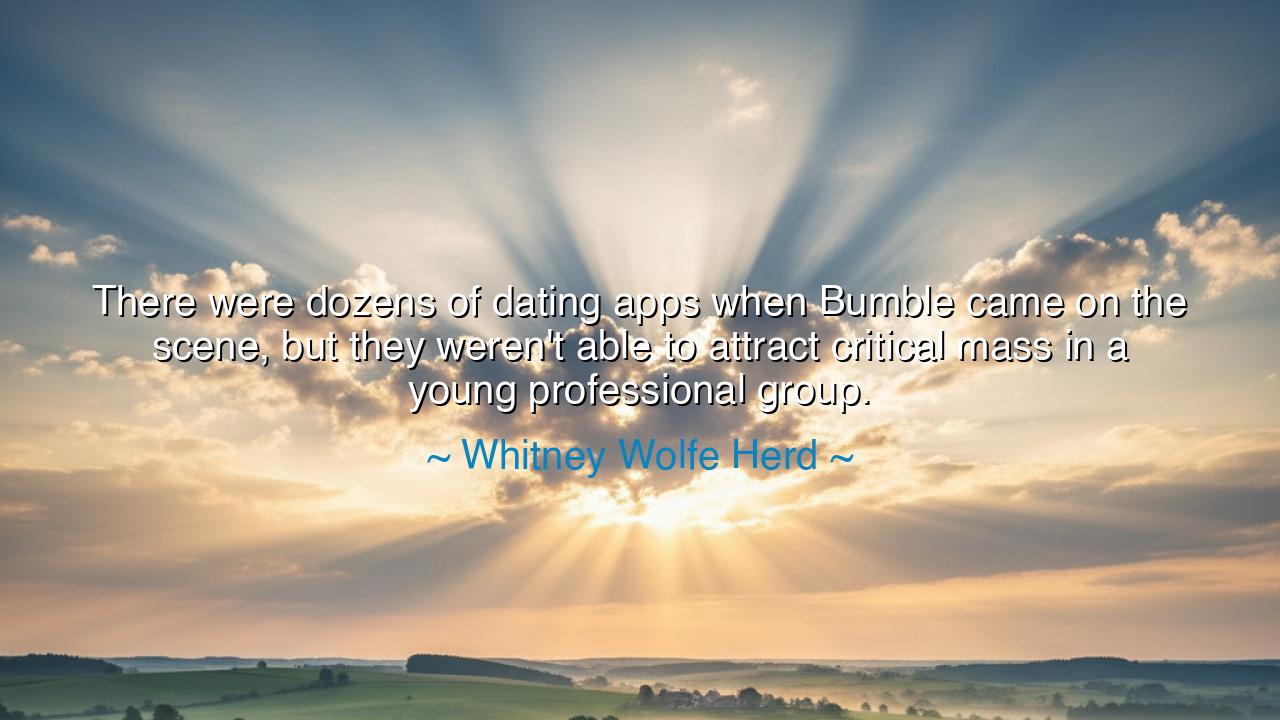
There were dozens of dating apps when Bumble came on the scene
There were dozens of dating apps when Bumble came on the scene, but they weren't able to attract critical mass in a young professional group.






Hear now the words of Whitney Wolfe Herd, the founder and visionary, who declared: “There were dozens of dating apps when Bumble came on the scene, but they weren’t able to attract critical mass in a young professional group.” Though spoken of commerce and technology, these words echo with the rhythm of deeper truth—of how vision, timing, and purpose can transform the ordinary into the extraordinary. For in every age, there are many who try, but few who ignite; many who build, but few who awaken the hearts of the people. Wolfe Herd speaks not merely of an app, but of a movement—a shift in how connection itself was understood, shaped by courage and the yearning for balance.
The origin of this saying lies in the birth of Bumble, a creation born not from convenience, but from conviction. Whitney Wolfe Herd, who once stood amid the tumult of another great company, chose to walk a new path—one guided by empowerment, dignity, and change. When she looked upon the digital landscape, she saw that though many dating apps existed, they were crowded yet hollow, noisy yet disconnected from the spirit of mutual respect. She saw that what the world needed was not another platform, but a reimagining of how people meet, how they speak, and how they value one another. Her insight was the seed that would grow into Bumble, where women could make the first move, and kindness—not conquest—would be the measure of attraction.
In her reflection upon “critical mass,” Wolfe Herd names a law that has governed all great revolutions, from the dawn of civilization to the age of the internet. Critical mass is the moment when idea becomes energy, when spark becomes fire, when scattered believers become a movement. History is rich with those who failed to reach it—many inventors, artists, and leaders who had vision but not the force to rally others. It was not enough to create; one must also inspire. And so it was with Bumble: what others could not achieve through imitation, Wolfe Herd achieved through innovation guided by empathy. Her success was not born of chance but of a deeper understanding of human nature—that progress follows not from abundance of options, but from the resonance of purpose.
The ancients understood this principle well. Consider the story of Alexander the Great, who, though one of many rulers, possessed a vision that unified nations. His conquests were not only of land but of ideas—he spread a language, a culture, a new way of understanding the world. His empire reached its “critical mass” not by force alone, but by inspiring loyalty through destiny. So too did Wolfe Herd conquer the crowded realm of digital connection, not by shouting louder, but by offering something truer. While others pursued popularity, she pursued meaning—and in that pursuit, the young and the professional, those weary of empty gestures, found a home.
Her words also reveal a truth about leadership and timing. In every field, there are countless voices vying to be heard. Yet, most fail not for lack of effort, but for lack of clarity. The difference between noise and music lies in intention. Wolfe Herd entered a crowded arena but played a different tune—a melody of empowerment in a cacophony of imitation. She teaches that to succeed, one must not fear the crowded field; one must differentiate through authenticity. When purpose aligns with innovation, even a single voice can rise above the multitude, as the lark sings above the storm.
Consider, too, what her words reveal about the young professional group she mentions. This generation, born into both opportunity and exhaustion, sought not excess but connection with substance. They had seen the rise of the algorithm and the fall of authenticity. They were yearning not for more tools, but for better values—honor, respect, equality, and choice. Bumble resonated with them because it reflected the changing consciousness of a new age, where relationships could be built on balance rather than dominance. Just as the Renaissance followed the long shadows of the Dark Ages, so too did this vision of dating emerge from the noise of superficial connection.
Thus, the lesson within Wolfe Herd’s words is one of vision, courage, and timing. In a world overflowing with imitation, dare to be original. In a market saturated with voices, speak with conviction. When others chase success, chase significance. The goal is not to exist among many, but to stand for something that others can believe in. Whether in love, work, or art, do not measure your worth by how crowded the field is—measure it by how clearly your purpose shines through it.
So, children of the digital age, remember this teaching: when you build, build not for the masses, but for meaning; when you lead, lead not through power, but through purpose. As Whitney Wolfe Herd reminds us, it is not the abundance of tools that changes the world, but the heart that wields them with vision. Many will create, but few will connect; many will try, but few will transform. Seek not to be one of many—but to be the one who brings light where others only left noise.






AAdministratorAdministrator
Welcome, honored guests. Please leave a comment, we will respond soon